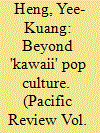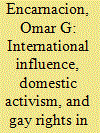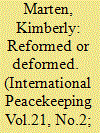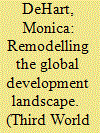|
|
|
Sort Order |
|
|
|
Items / Page
|
|
|
|
|
|
|
| Srl | Item |
| 1 |
ID:
131882


|
|
|
|
|
| Publication |
2014.
|
| Summary/Abstract |
Many studies of Japan's soft power are premised on the 'affective' dimensions of its kawaii pop culture that generate liking or interest. While entirely warranted, emphasising cultural attraction does not do sufficient justice to the multi-faceted foundations of Japanese soft power. Neither does it recognise other components of Joseph Nye's soft power framework stressing the 'normative' appeal of policies that reflect global norms. This article investigates the 'normative' dimensions of Japan's soft power on climate change, and whether it translates into international influence, as Nye predicted. The first section examines the Cabinet's 2010 New Growth Strategy, identifying a potential source of 'normative' soft power in its self-proclaimed desire to reinvent Japan as a 'trouble-shooting nation on global issues', specifically environmental challenges. Next, it analyses how Japanese entities (government, corporations, and NGOs) can transmit 'normative' soft power, and obstacles encountered. These transmission mechanisms include 'Cool Earth Partnership' programmes, the 'Future City Initiative' and the values-based Satoyama Initiative. The final section addresses conceptual implications that arise, and assesses whether Japan's 'normative' soft power has paid dividends. Drawing from literature on pioneer states and external reviews of Japan's alignment with key climate norms, the paper suggests that Japan's normative soft power is lacking in driving agendas at global climate forums. At a pragmatic problem-solving level, however, Japan is increasingly perceived as an attractive source of transferable solutions, reflecting climate norms such as developing eco-friendly technologies and providing assistance to help vulnerable countries mitigate climate change
|
|
|
|
|
|
|
|
|
|
|
|
|
|
|
|
| 2 |
ID:
104221


|
|
|
|
|
| Publication |
2011.
|
| Summary/Abstract |
China's rise is accompanied by a corresponding growth in its international influence. Not only does this kind of influence have its roots in history and imagination, but it is also an inevitable result of China's growing strength and economy over the past few decades. It is difficult to accurately quantify a country's international influence. China's growing international influence has its own distinct characteristics, marked by the country's unique national interests. A more influential China is not only good for China's own development; it is also good for the world.
|
|
|
|
|
|
|
|
|
|
|
|
|
|
|
|
| 3 |
ID:
170934


|
|
|
|
|
| Summary/Abstract |
This contribution to the Forum examines the contemporary role of state foreign services in the practice of current international relations and their impact in the level of activity and influence of their countries foreign policies in the international system. In particular, studying relevant variables such as budget, legal powers, size, distribution, and professionalisation of state foreign services, it analyses the role of the ministries of foreign affairs and state foreign services in two Latin American countries, Brazil and Mexico, to evaluate if their characteristics have an impact in their global influence. It argues that the differences in the diplomatic capacities of these countries have an effect on their foreign policies’ impact in world affairs
|
|
|
|
|
|
|
|
|
|
|
|
|
|
|
|
| 4 |
ID:
163126


|
|
|
|
|
| Summary/Abstract |
This article argues that the concept of entrepreneurial state is useful for analyzing Mexican foreign policy during recent decades. It argues that Mexico has behaved as an entrepreneurial state, following a limited foreign policy agenda to address national priorities, with important restrictions in terms of resources and agency, but seeking to obtain international recognition as a relevant global player that has influence on world affairs. This entrepreneurial behaviour is analyzed in Mexico's participation in international organizations (UN) and negotiations (climate change), mini-lateral mechanisms (MIKTA), and regional affairs (Central and Latin America). These cases show that, due to its limited capacities and agency, but its desire to become a relevant regional and global player to advance its national interest, Mexico has created coalitions with like-minded countries, pursued limited but domestically relevant global objectives, and invested its scarce foreign policy resources in an entrepreneurial manner.
|
|
|
|
|
|
|
|
|
|
|
|
|
|
|
|
| 5 |
ID:
126695


|
|
|
|
|
| Publication |
2013.
|
| Summary/Abstract |
IN JULY 2010, ARGENTINA BECAME THE FIRST NATION in Latin America, and only the second one in the developing world after South Africa, to pass a law legalizing same-sex marriage; shortly thereafter, the country enacted what is arguably the most progressive transgender law of any country in the world. It allows for a change of gender without undergoing surgery or receiving authorization from a doctor or a judge. Both laws have put Argentina in a select group of nations regarded as being on the cutting edge of gay rights and atop international rankings of countries most open to issues of concern to the lesbian/gay/bisexual/transgender (LGBT) community, such as the recently developed "Gay Friendliness Index."1 Neither societal factors nor political conditions could have predicted this cascade of gay rights advances.
|
|
|
|
|
|
|
|
|
|
|
|
|
|
|
|
| 6 |
ID:
135221


|
|
|
|
|
| Summary/Abstract |
This essay looks back on three classic texts depicting Canadian foreign policy during the Vietnam era in pursuit of lessons for policymakers in Ottawa today. It concludes that Canadians should not be so self-critical of their country’s inability to exercise influence on complex and difficult global problems. While Canada continues to be able to make a helpful contribution to world affairs, Canada’s international engagements should focus less on the often unrealistic desire to enhance the country’s image and standing abroad and at home and more on immediate tactical and operational impacts.
|
|
|
|
|
|
|
|
|
|
|
|
|
|
|
|
| 7 |
ID:
133137


|
|
|
|
|
| Publication |
2014.
|
| Summary/Abstract |
A great deal of international attention and funding was given to reform and training of the Palestinian Authority Security Forces (PASF), starting with the Oslo Accords process in 1993 and accelerating with the advent of Fayyadism and the expulsion of the Palestinian Authority government from Gaza in 2007. Many donors and other supporters in the US, the EU, and Israel claimed this process as a success story, and indeed from 2008-2010 local conditions looked hopeful in the fragile, post-conflict West Bank proto-state. But soon unresolved political conflicts inside the West Bank encouraged patronage-based violence to reemerge within the security forces, and the fractured approach of the international community aggravated the situation. By 2013 reform had stalled. This article explores the history of patronage politics in the PASF and uses the Palestinian example to highlight the tensions inherent in contested visions of security, when international donors define success in terms of anti-terrorism rather than genuine domestic security governance.
|
|
|
|
|
|
|
|
|
|
|
|
|
|
|
|
| 8 |
ID:
116878


|
|
|
|
|
| Publication |
2012.
|
| Summary/Abstract |
China's explosive growth and growing international influence have prompted policy makers and scholars to question how that country will reshape the global development landscape. While Western observers have used the concept of the China Model to describe China's development strategies and the potential threat they pose to Western liberal traditions, Chinese policy makers have promoted South-South cooperation to emphasise China's goal of a harmonious world order based on nation-state sovereignty and mutual benefits. This article explores these two competing organising principles with a focus on how each concept frames global development politics and China's relations with its development partners. Drawing on ethnographic research on China's new relationship with Costa Rica, I examine the assumptions and effects of these concepts in terms of how they shape specific development encounters. These examples suggest the intransigence of historical development inequalities and identities, which both support and limit China's global impact in significant ways.
|
|
|
|
|
|
|
|
|
|
|
|
|
|
|
|
| 9 |
ID:
101716


|
|
|
|
|
| Publication |
2010.
|
| Summary/Abstract |
It goes without saying that the "game" being played in the post-Soviet space remains a priority for the Russian Federation in building up its international influence and foreign policy strategy in general. Creation of Russian soft power resources through consolidation and organization of the Russian diasporas is an indispensable condition for effective work on this foreign-policy track.
|
|
|
|
|
|
|
|
|
|
|
|
|
|
|
|
| 10 |
ID:
171082


|
|
|
|
|
| Summary/Abstract |
The Belt and Road Initiative (BRI) has been widely criticized as a purely strategic project to enhance China’s international influence. Focusing on an ongoing yet underresearched signature BRI project, the China-Europe freight train routes, this article challenges such a sweeping characterization, which has masked the complexities of the reality. The freight initiative arose from local-level actors in multiple sites as a cost-effective means to make use of preexisting rail tracks across Asia to enhance transport efficiency. Their efforts later metamorphosed into what today looks like a grand unified project, politicized by the national government and subsidized by competing provincial capitals. The article provides an explanation for the complex consequences of the freight train project’s politicization.
|
|
|
|
|
|
|
|
|
|
|
|
|
|
|
|
| 11 |
ID:
153945


|
|
|
|
|
|
|
|